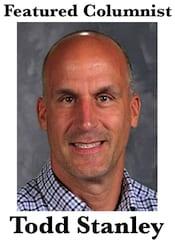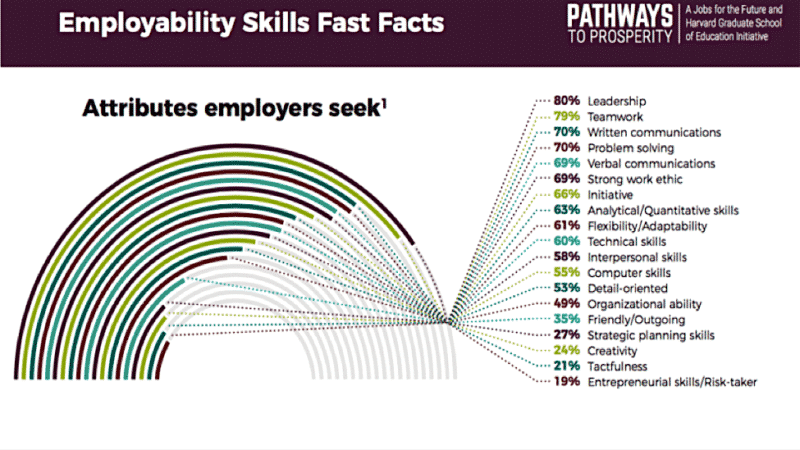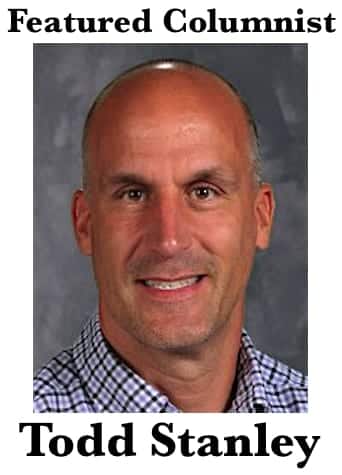Balancing data with important 21st-century skill sets
 One idea that has permeated education for the past few years is that of data, and using it to drive and shape instruction. This is a great idea because you as the teacher find out what is working effectively in your classroom and what might not be getting students where you want them to be. In essence, it allows you to get the biggest bang for your buck.
One idea that has permeated education for the past few years is that of data, and using it to drive and shape instruction. This is a great idea because you as the teacher find out what is working effectively in your classroom and what might not be getting students where you want them to be. In essence, it allows you to get the biggest bang for your buck.
Schools have embraced this, turning to data teams to analyze all of the information we collect on students and figuring out how to teach them better. We make SMART goals to accomplish this:
S – Specific
M – Measurable
A – Assignable
R – Realistic
T – Time-related
 The basic premise of a SMART goal is that it is something that can be measured, either through an assessment, evaluation, or observation. Like many things in education, we seem to have taken this concept to the extreme where we are not letting anything into the classroom unless it can be measured. As a result, there are certain unmeasurable intangibles that have been left by the wayside.
The basic premise of a SMART goal is that it is something that can be measured, either through an assessment, evaluation, or observation. Like many things in education, we seem to have taken this concept to the extreme where we are not letting anything into the classroom unless it can be measured. As a result, there are certain unmeasurable intangibles that have been left by the wayside.
For example, I can remember when I was setting goals for my gifted students on their Written Education Plans. Some of the goals were, “would like to see him taking on more of a leadership role”, “would like her to become more comfortable with speaking in public”, and “would like to see him push himself to the next level of thinking”, all things that gifted students should be doing. My principal refused to sign the plans. He said, “these aren’t things I can measure.” I argued that they could be informally measured through observation which he batted away like King Kong does biplanes. He wanted me to link the goals to their STAR results.
For those of you who aren’t familiar with STAR, it is a reading and math program where students take a test three times a year and are compared with everyone else who took the test. It gives them a percentile rank and a grade level they are performing at. These assessments rarely ever contain any higher level questions, and gifted students many times will score in the 99+ on the first test. Where can they go from there? This measured test was not designed for gifted students but rather the typical student, so this data while measurable, was not particularly valuable or informative for me. Nonetheless, my principal insisted.
This is what can happen many times in the educational system. People who are making the decisions lack a fundamental understanding of the needs of gifted students. It is not necessarily their fault. They lack training and professional development in this area. Most teacher and administration training programs rarely ever talk about how to serve the needs of gifted students. This is where my principal was coming from. While I was balancing both academics with social/emotional needs, he was focused on only the academics, and then only the academics that could be measured. I think this is a big mistake because there are some very valuable skills that are going to be ignored that would be way more helpful to children than a lot of the content we teach them.
What I propose is that instead of writing just SMART goals, we might want to consider writing some DUMB ones. That principal would have argued my goals were already dumb, but what I mean by this is:
D – Discipline/Professional Skills
U – Used to
M – Make one
B – Balanced
These DUMB goals are the 21st-century skills that we should be equipping all of our students with and yet because of the focus on data; these are not being addressed. Some of these skills include:
- Collaboration and teamwork
- Creativity and imagination
- Critical thinking
- Flexibility and adaptability
- Oral communication skills
- Leadership
When you look at this list, there isn’t a test that can be given to determine mastery of these. And yet when Pathways to Prosperity reached out to employers to see what attributes they were looking for in regard to incoming workers, this is list they created:
 I would argue that out of this list of 19 skills, 14 of them would be very difficult to measure in a classroom using a SMART goal; leadership, teamwork, verbal communications, strong work ethic, initiative, analytical skills, flexibility, interpersonal skills, organizational ability, friendly, creativity, tactfulness, and risk-taker. If we stop teaching these in the classroom, we will be sending our students out into the workforce grossly unprepared and at a clear disadvantage.
I would argue that out of this list of 19 skills, 14 of them would be very difficult to measure in a classroom using a SMART goal; leadership, teamwork, verbal communications, strong work ethic, initiative, analytical skills, flexibility, interpersonal skills, organizational ability, friendly, creativity, tactfulness, and risk-taker. If we stop teaching these in the classroom, we will be sending our students out into the workforce grossly unprepared and at a clear disadvantage.
I would also argue these are not just skills that we should be teaching to our gifted students. Every student could use these skills. Think about your own adult life, how often are you using content you learned in school? I work in a school, and I would say very rarely. Instead, I am using the 21st-century skills that I learned over a lifetime in my day-to-day tasks in order to learn what I have to do to accomplish my job.
I am by no means suggesting that we ignore the content. Students still should be taught the basics of a given subject matter. What I’m suggesting is that in order to have balanced students, ones that will succeed in whatever they choose to do because we are preparing them for jobs that do not even exist yet, we need to give them the skills needed to do any job. That is where the 21st-century skills come into play. I would feel a whole lot better about a student who left my classroom with the ability to speak publically or collaborate with others than I would about him memorizing facts about our Constitution or knowing the dates or names of battles during the American Revolution.
With that in mind, I will continue to look for SMART goals to grow my students and to make my teaching more effective, but I will definitely balance them with some DUMB goals that prepare my students for life after school.
Author
Todd Stanley is the author of several education books including Project-Based Learning for Gifted Studentsand Performance-Based Assessment for 21st-Century Skills, both for Prufrock Press.
Additionally, he wrote a series of workbooks for them entitled 10 Performance-Based Projects for the ELA/Math/Science Classroom. He wrote Creating Life-Long Learners with Corwin Press and is a regular contributor of blogs to Corwin Connect which can be accessed at https://corwin-connect.com/author/toddstanley/.
You can find out more about Todd at MyEdExpert.com and you can follow him on Twitter.
Further Reading
- Forbes – Four Essential Skills For Workplace Success In The 21st Century Digital Economy
- Education Week – Makerspaces: Building Community and 21st-Century Skills in Detroit
- edCircuit – Teaching Students To Stand Up To The Mic

